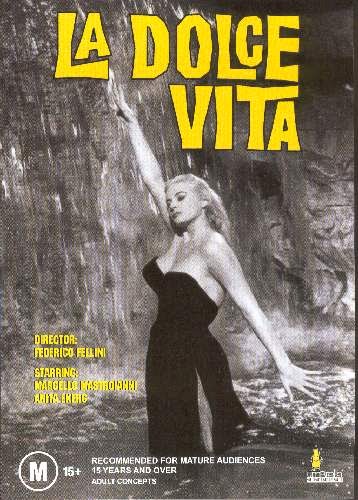Marcello Rubini was once a fine writer who has now descended
to the rank of fine journalist. Seemingly, he has it all: women,
sophistication, connections, the best of everything, but the sweet life proves
not to be everything as, despite everything he has, he’s not a happy or
satisfied person. When a glamorous American actress comes to Rome, she enchants
Marcello and the inaccessibility of his desire slowly sends him on a downward
spiral.
Like A Clockwork Orange and The Cook, The Thief, His Wife, and Her Lover,
Federico Fellini’s La Dolce Vita
takes what is considered glamorous and sophisticated and overcharges it,
turning it into something that is almost repulsive. This film is probably most
famous for coining the term ‘paparazzi’, which stems from one of its
photojournalist characters, so there’s your bit of trivia for the day. But
trivia aside, La Dolce Vita still
stands as a remarkably cool and glamorous movie that depicts something not very
nice, but does it in such a way that makes it look amazing.
Marcello Rubini was
once a fine writer who has now descended to the rank of fine journalist.
Seemingly, he has it all: women, sophistication, connections, the best of
everything, but the sweet life proves not to be everything as, despite
everything he has, he’s not a happy or satisfied person. When a glamorous
American actress comes to Rome, she enchants Marcello and the inaccessibility
of his desire slowly sends him on a downward spiral.
Whilst it took me a while to
establish what was happening (I think this happens more often than not for
Western viewers of foreign movies who aren’t quite as ‘cultured’ as they could
be), I cannot deny that there is something incredibly glamorous but at the same
time un-glamorous about this movie. The fact that it’s a 60s movie done in
black and white instantly says ‘sophistication’, taking us back to the
Classical Hollywood Era. There are fast cars, champagne, beautifully clad women
with exquisite makeup, irrepressibly cool sunglasses, parties, colourful
characters, and the image of the beautiful blonde American actress in the
fountain is one that is recognised the world over! Everything about this movie is dripping with glamour and classiness
but its story then works against that by chronicling tales of woe and descent
in social circles. A line towards the end of the film, “by 1965, there’ll be
total depravity” really highlights the messages that this movie sets out to
convey: the dehumanising effect of socially sanctioned glamour and
sophistication as well as the slow erosion of willpower and ambition that comes
as a result of having the finer things accessible to you. There’s an awful lot
going on this movie and every event that happens carries some hidden message or
dual meaning, which makes it a great film to watch and interpret.
Starring
Marcello Mastroianni, Anita Ekberg, Anouk Aimee, Yvonne Furneaux, Magali Noel,
Alain Cuny, Annibale Ninchi, Walter Santesso, Valeria Ciangottini, Riccardo
Garrone, Ida Galli, Audrey McDonald, Polidor, Alain Dijon, and Enzo Cerusico, La Dolce Vita is an elegant movie filled
with glamour, romance, drama, descent, and comedy. It’s a film that I don’t think
I appreciated as fully as I could (because I’m really not all that cultured or
cinematically aware no matter how it sounds here), but it’s definitely a film
that I was entranced by. Only a handful of movies in history have been both glamorous
and un-glamorous and Fellini does it very well.

No comments:
Post a Comment